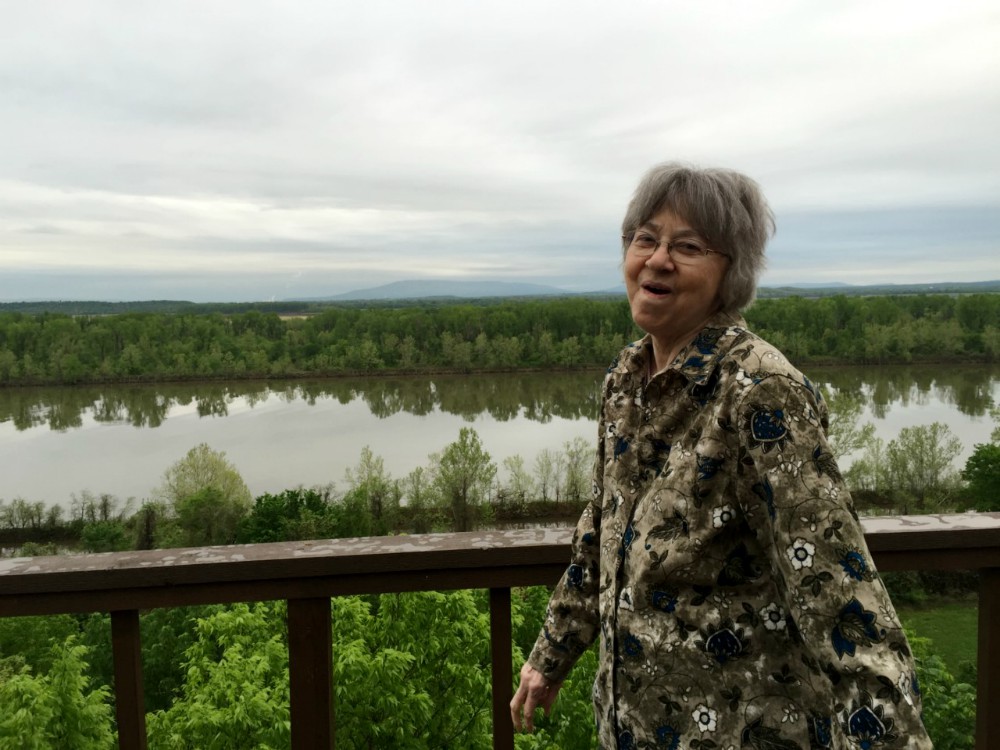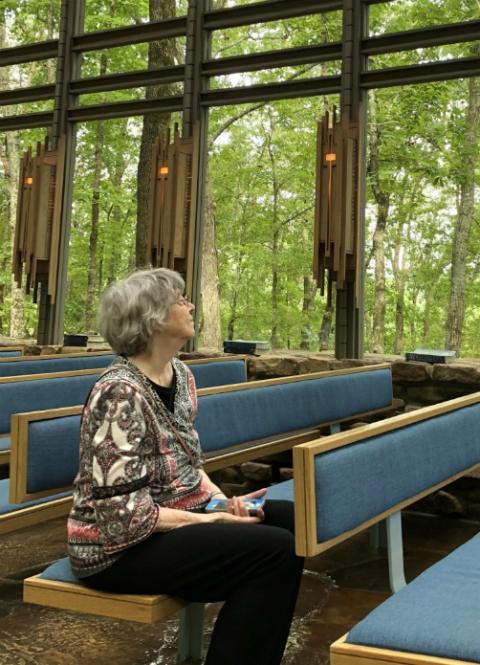
Benedictine Sr. Macrina Wiederkehr on a walk with the writer (Judith Valente)
There are people we encounter who transform our lives. We meet them by a grace that we neither expect nor deserve. For me, Benedictine Sr. Macrina Wiederkehr was one of those people. She died April 24 of a brain tumor at the age of 80. I have been reflecting on a few of our experiences together that reveal her expansive spirit.
I became acquainted with Sister Macrina first through her books on Benedictine spirituality, starting with Seven Sacred Pauses, then The Song of the Seed, Abide, and on down the line until I had read every one of her works. She wrote as I imagined a mystic would: keenly attuned to reality and to the meaning and truth behind everyday experiences that the rest of us are too distracted or self-absorbed to perceive.
In 2016, I was invited to guide a retreat for her monastic community, St. Scholastica Monastery in Fort Smith, Arkansas. Because of my awe for Sister Macrina's writing, I almost said no to the invitation. I questioned what I possibly could offer a community that included a modern-day prophet.
Another Benedictine mentor of mine encouraged me to say yes. Deep down, I knew I would regret missing the chance to meet Sister Macrina in person if I had said no.
My first morning at the monastery, as I went through the breakfast line with my tray, a tall, slender, silver-haired sister bounded over to me. In the most delightful drawl, she said, "Hi, I'm Macrina." I hadn't recognized her!
When it was time to make my first presentation, Sister Macrina was seated to one side of the meeting room. As I arranged my papers at the podium, she stood for a moment, clasped her hands together, and gave me a bow.
I still tear up thinking of that moment of grace. That generous gesture from a master teacher gave me the confidence I needed to forge on with my presentation, impoverished as it might be.
Advertisement
The night before I was to leave for home, she came to my room with Sr. Madeline Bariola, one of her close friends in the community. She was carrying a can of spiced almonds someone had brought back from Africa for her and a couple of single-serving bottles of wine similar to the kind you're given on airplanes, which she got from who knows where.
I wish I could recall the conversation that night. What I remember is our laughter, the sheer joy of simply being together.
When I returned to the monastery in March 2019 to give another program, I was able to spend much more one-on-one time with Sister Macrina. She showed me her room in the new monastery, which the sisters had just moved into. She was giddy about having her own private toilet. She loved the view from her room and had placed some pillows and blankets on a window seat. The window looked out on the monastery's cemetery and some tall pines. Death and life, she said.
A clock in the room had stopped at four o'clock. "It's been four o'clock for six weeks now," she told me. "That's all right. It's four o'clock somewhere in the world."
We took a walk on a summer-like afternoon in Carol Ann Cross Park, where children were chasing ducks and men were fishing in the pond. Spring wildflowers spread out in an array of colors. Sister Macrina would stop in midsentence to gasp with delight at the sight of a patch of bluebells, Johnny jump-ups or purple clover.
She could be charmingly self-aware too. I wanted to take a photo of her in the park, but she kept deleting the ones I snapped, saying she didn't like the way she looked in them. Only later did I realize she had deleted all of the photos I'd taken of her in the park.

Sister Macrina in Thorncrown Chapel, Eureka Springs, Arkansas (Judith Valente)
After our walk, we went on to Tropical Smoothie — a pilgrimage stop on her excursions outside the monastery — where she ordered one of her favorites, the Bahama Mama. It is hard to believe that a little over a year later this fun-loving woman would be gone from a world that brought her so many simple delights.
Sister Macrina decided to let her diagnosis take its course rather than spend whatever time she had left trapped in hospital rooms in an endless whirl of tests and procedures. Something she shared with me on that last visit seems prescient now. She told me, "Hope trails alongside me like my best friend no matter how desperate I might feel."
They weren't just words. It was her way of life. In her last weeks, she asked to be wheeled outside to watch the sun rise, to see the April "super moon" and the pink and orange azaleas and purple irises bursting open on her monastery's grounds.
Words she wrote well before the current pandemic seem to speak our current struggles. "We sometimes forget how important it is that we always honor the need to be still, motionless, not moving at all," she wrote in one of her essays. "How difficult it is to stand silent and unmoving with our flask of oil, which is our very being, and let God anoint our restless hearts."
Throughout her illness, Sister Macrina's family members, her vast number of friends, and most especially her monastic sisters were by her side to "anoint" her heart.
Sister Macrina once said she wanted to be a blessing to others, "another Christ, a servant leader, a disciplined disciple." She was all that and more. She taught us to give thanks always, for hope trails alongside us like a best friend.
[Judith Valente is the author of How to Live: What the Rule of St. Benedict Teaches Us About Happiness, Meaning, and Community and the senior correspondent at GLT Radio, an NPR affiliate in Illinois. She is a Benedictine oblate of Mount St. Scholastica Monastery in Atchison, Kansas, and has served on the volunteer board of the American Benedictine Academy since 2014.]







